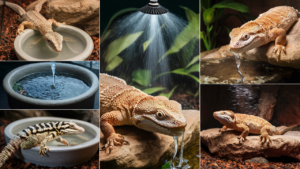This article delves into the essential practices of animal care, discussing behavioral enrichment for birds, effective fish tank setup steps, dietary management for rabbits, and stress prevention techniques for reptiles. Understanding these aspects not only promotes animal welfare but also enhances the overall experience of keeping pets healthy and content.
Understanding Bird Behavioral Enrichment
Behavioral enrichment is crucial for pet birds, as it stimulates their natural instincts and promotes emotional well-being. Strategies include offering varied toys, interactive foraging opportunities, and frequent social interaction, all of which replicate their natural behaviors and significantly reduce stress.
Setting up a fish tank requires careful planning to create a thriving aquatic environment. Start by selecting an appropriate tank size based on the fish species. Incorporate a reliable filtration system, choose suitable substrates, and decorate with natural elements while monitoring important water parameters to ensure the health of your aquatic life. Regular maintenance, including cleaning and water changes, is essential to sustaining this ecosystem.
Essential Steps for Setting Up a Fish Tank
Setting up a fish tank requires careful planning. Start by selecting an appropriately sized tank, ensuring it matches your space and desired fish species. Choose a reliable filtration system to maintain water quality and minimize maintenance efforts.
For substrate, select natural options like gravel or sand, tailoring it to the fish you intend to keep. This choice impacts both aesthetics and habitat functionality. Decorate the aquarium with plants, rocks, and hiding spots to create a stimulating environment and reduce stress for fish.
Understanding water parameters—such as pH, ammonia, nitrite, and nitrate levels—is vital. Regular water testing ensures a healthy environment, fostering optimal fish health. Establish a routine for cleaning and maintaining the tank, including water changes and filter upkeep, to sustain a balanced ecosystem and avoid harmful fluctuations.
Managing a Rabbit’s Diet
Managing a Rabbit’s Diet: Rabbits thrive on a diet rich in fresh hay, leafy greens, and controlled pellets. High-fiber hay promotes digestive health, while a variety of greens offers essential nutrients. Monitor portions to prevent obesity and digestive issues, adjusting as needed. Keep a diet log to track changes and preferences.
Preventing Stress in Reptiles
Stress in reptiles often stems from inadequate habitat conditions and environmental mismatches. To mitigate this, focus on proper habitat design that mimics their natural environment. Use varied substrates and hiding spots to encourage exploration and security.
Temperature control is crucial; create a thermal gradient in the enclosure to allow reptiles to regulate their body temperature. Monitor conditions closely, as fluctuations can induce stress and health issues. Employ reliable thermometers and check humidity levels frequently.
Integrate environmental enrichment, such as climbing structures or foraging opportunities, to stimulate natural behaviors and reduce monotony. This not only occupies them but also fosters mental health, contributing to relaxation.
Recognizing symptoms of stress is essential. Look for indicators like hiding, loss of appetite, or lethargy. Promptly addressing these signs can prevent deeper psychological and physical health issues, ensuring a harmonious living situation.
Integrating Care Practices for Optimal Pet Welfare
Integrating behavioral enrichment, habitat setup, dietary management, and stress prevention creates a holistic approach to pet care. By considering each aspect, pet owners can foster enriching environments that promote physical health, mental stimulation, and overall happiness, ensuring pets thrive in their homes.
Conclusions
In conclusion, effective animal care encompasses various factors such as behavioral enrichment, proper habitat setup, and tailored dietary management. By implementing these practices, pet owners can ensure the well-being of their animals, preventing stress and promoting a thriving environment. Consistent attention to these needs is vital for responsible pet ownership.



